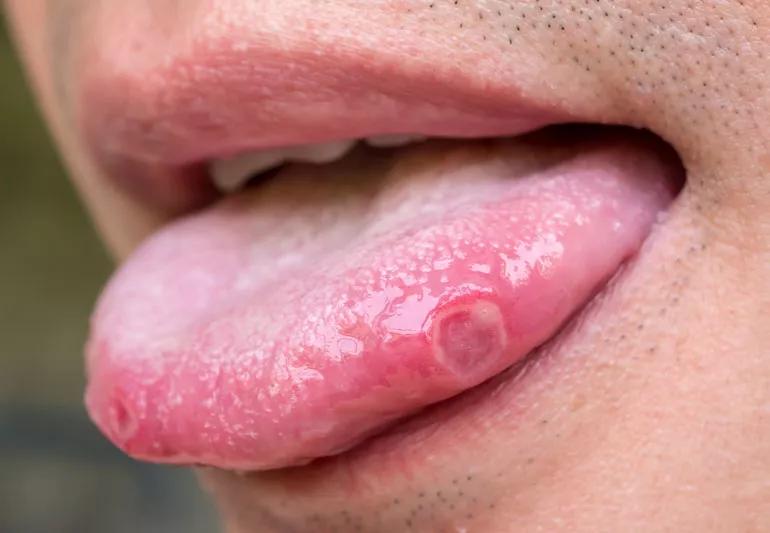Watch out for these oral cancer symptoms

Image content: This image is available to view online.
View image online (https://assets.clevelandclinic.org/transform/dde53f3e-dfd7-44f8-a5ba-e1cecf078df4/mouthUlcers-956084414-770x533-1_jpg)
mouth ulcer
If you have a bleeding mouth sore or pain that lingers for more than a couple of weeks, don’t ignore it.
Advertisement
Cleveland Clinic is a non-profit academic medical center. Advertising on our site helps support our mission. We do not endorse non-Cleveland Clinic products or services. Policy
“We see patients all the time who had an irritation around their tooth that ends up being squamous cell cancer, which may have been bothering them for up to a year,” says ear, nose and throat specialist Brian Burkey, MD, MEd.
Some oral cancers are not obvious to us as we look in a mirror and can even be hiding behind the teeth or under the tongue.
“The good news is that when picked up early, these cancers are highly, highly curable,” says Dr. Burkey. “Early detection is key.”
It’s important not to ignore these symptoms, which could signal medical problems or, in limited cases, oral cancer:
While not an exhaustive list, these are symptoms that can slip under the radars of our busy lives.
“That’s why it’s important to notice when they don’t resolve,” says Dr. Burkey. “If symptoms last for more than two weeks, get them checked out by a doctor or dentist.”
Advertisement
Besides watching for any symptoms, it’s important to get regular oral cancer screenings to catch problems at their earliest stages. Here, Dr. Burkey explains what you need to know — and what to expect:
Who does the screenings? Your dentist is often your first line of defense when screening for oral cancer, but oral surgeons and ear, nose and throat specialists can also perform screenings.
How often do I need a screening? While there are no official recommendations for screenings, it’s important to get screenings during your usual dental checkups, twice a year.
Do I need to request a screening from my dentist or are they routine? Screenings are generally part of your normal dental exam, but ask your dentist to do one if they haven’t.
How long to screenings take? Oral cancer screenings take less than 10 minutes. Your doctor or dentist will perform a visual screening and feel the tongue looking for abnormal color and firm lesions. You also fill out an information form so that the doctor or dentist can pay close attention to any specific areas of concern.
Do the screenings hurt? No, they are generally painless.
Here are ways to lower your risk of getting oral and head and neck cancers:
Advertisement
Advertisement

Sign up for our Health Essentials emails for expert guidance on nutrition, fitness, sleep, skin care and more.
Learn more about our editorial process.
Advertisement
What you need to know if your doctor prescribes a topical mouthwash
Nicotine replacement products and relaxation techniques can help you ditch the dip
Each comes with substantial health risks and should be avoided
It starts off like a cold and then progresses to a rash that can last about 10 days
Most recommended precautions center around minimizing bruising or swelling
Even one drink can have an impact on your cognitive function leading to slurred speech, blurred vision and impaired memory
Type 2 diabetes isn’t inevitable with these dietary changes
Applying a hot or cold compress can help with pain
Pump up your iron intake with foods like tuna, tofu and turkey